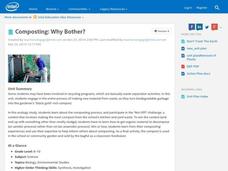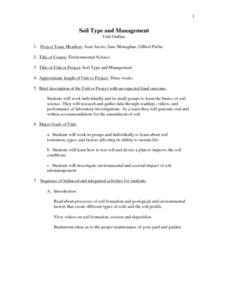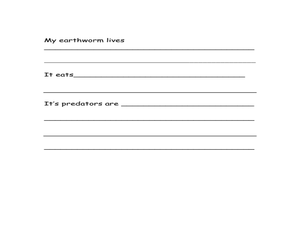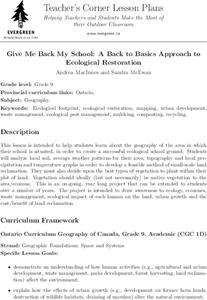Intel
Composting: Why Bother?
The first STEM lesson in a group of 10 explores composting. After discussing how to make a better tomorrow, classes are challenged to track garbage in their communities, visit a local waste management facility, and conduct a survey...
Curated OER
Composting Conundrum
Learners research cafeteria composting. In this composting lesson, students design a vessel that would allow the cafeteria staff to collect food scraps for composting. Then learners build a prototype and present it to the class. Lastly...
Curated OER
Composting Presentations
Students create an presentation that suggests composting as a possible solution to solid waste issues. They research the types of solid waste that can be composted, the composting process and the role of worms in composting.
Curated OER
The Trash We Pass
Where does our garbage go? What is the difference between a recyclable and non-recyclable item? Pose these important, but often overlooked, questions to your class and invite them to consider the lasting and damaging effects of the...
Curated OER
Recycling: The Way to Save...Fad or Fact
Students write stories about recycling and illustrate them. They examine various containers and determine whether or not they are recyclable. They make a chart about the containers and visit a recycling center.
Curated OER
Organic and Inorganic Recycling
Students examine their role in polluting the environment and discuss the importance of recycling. In groups, they place earthworms into compost piles to observe why they are considered natural recyclers. They also practice sorting a...
Curated OER
WHAT'S ORGANIC?
Middle schoolers explore how certain foods come to be certified "organic." They write the words "organic" and "synthetic" and given the definitions of each. Students are given dictionaries. They are asked: "What is organic food?" Middle...
Curated OER
Big Fat, Juicy Worms
Pupils collect and study information about worms. They discover how an earthworm helps process and loosen the soil. They write in their journals as well.
Curated OER
Earthworm Bridge
Fourth graders complete analysis experiments for decomposers and their adaptable traits. In this decomposers lesson, 4th graders test worm behavior to light, sound, warmth, touch, and moisture. Students work in groups to analyze the...
Curated OER
Save Our Soil
Students explore the need for good farm land and reasons for the disappearance of agricultural areas. They brainstorm environmental friendly decisions and soil conservation. In their community, students explore new land developments...
Curated OER
Soil Type and Management
Students study the basics of soil science. They research and gather data through readings, videos, and performance of laboratory investigations. As a team they generate oral and written recommendations for the amendment of soil.
Curated OER
Earthworms and Making a Wormery
Students explore the environment by researching insects. In this earthworm lesson, students utilize soil and plexiglass to build a see through wormery in which students can observe the worms at work. Students identify the benefits of...
Curated OER
Give Me Back My School: A Back to Basics Approach to Ecological Restoration
Ninth graders research local geography to create successful, ecological school landscaping. They determine soil type, average weather patterns and temperature graphs and use the information to select ideal plants and plant maintenance...
Curated OER
Sowing Seeds
Students observe earth science by participating in a planting activity. In this seeds activity, students identify the process for seeds to transform into plants which eventually produce food. Students sow seeds in the ground and...
Curated OER
God's Creation
Second graders explore religion by analyzing the state of the country. In this American creation lesson, 2nd graders read that God created the world and therefore the United States and all of the beautiful things within the country....
Curated OER
Fish Parasite Survey
Students survey and dissect as many fish as possible. They count nematodes, cestodes and crustaceans on the fish, fill out autopsy reports, and transfer data to a chalkboard data table. Students graph the results of the entire class...
Curated OER
Worms in a Bottle
Students gain a better understanding of the worm and its role in the recycling of organic materials into simpler forms by constructing worm bottles and observing for 60 to 90 days.
















